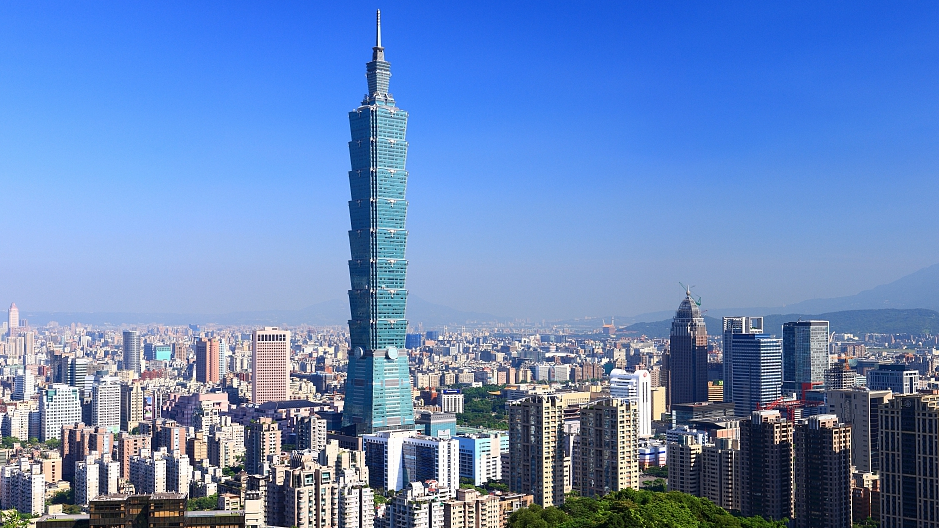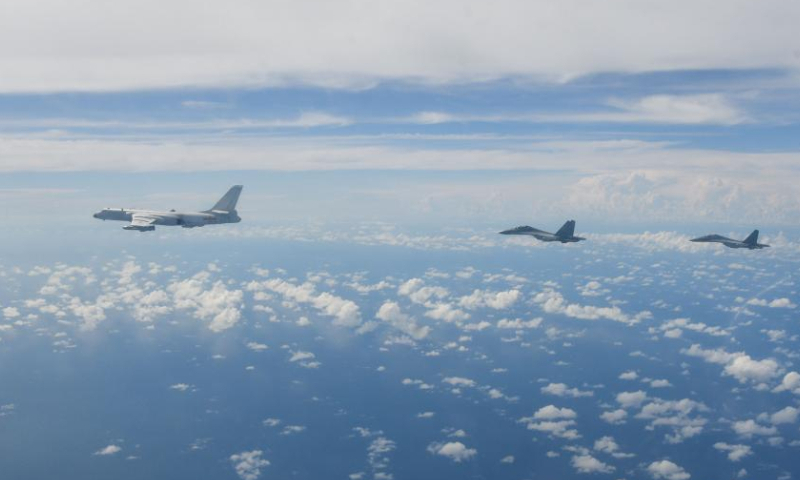
The Taipei 101 skyscraper in Taipei, China's Taiwan. /Xinhua
The Taipei 101 skyscraper in Taipei, China's Taiwan. /Xinhua
Editor's note: Stephen Ndegwa is a Nairobi-based communication expert, a lecturer-scholar at the United States International University-Africa, and an author and international affairs columnist. The article reflects the author's opinions and not necessarily the views of CGTN.
As observers predicted, the United States has finally approved a controversial $1.1 billion arms sale to China's Taiwan. Even without the fact that this was a totally insensitive and provocative move, it was a deal that was too good for the superpower's insatiable military-industrial complex to forego.
Currently, the U.S. is undergoing grave economic challenges due to a combination of both internal and external factors. Therefore, it needs all the money it can mop up, even if it means selling the remaining shreds of its already tattered soul. It is no longer a secret that most of the U.S. supposed peace interventions are motivated by the billions of dollars in revenue from the sale of arms.
Well, the ongoing tug-of-war with Taiwan serves two purposes for the U.S. in its quest to maintain a hegemonic grip in the region. Of course, there is the money bit. The current expensive deal includes a radar system to track incoming strikes, and both anti-ship and anti-air missiles. One can only imagine the amount of money Taiwan will spend for full-fledged combat hardware in case the strait become a theater of war. For instance, the U.S. has recently announced $800 more million military aid to Ukraine to sustain its months-long conflicts with Russia.
The U.S. looks hell-bent on provoking China to a duel on the Taiwan Strait. The decision to sell arms to Taiwan was a gross interference in China's internal affairs. It was aimed at escalating the growing tensions between the two countries since the visit to Taiwan by U.S. House of Representatives Speaker Nancy Pelosi last month amid protestations by Beijing. The message from Washington so far seems to be, "do your worst."
It is not clear why the U.S. has underrated China's resolve on the Taiwan question. The superpower has mistaken patience for cowardice and is pushing its luck too far. The superpower cannot say that China should follow the path of dialogue on one side, and on the other engage in blatant actions that give a contrarian impression.
China has already stated through its embassy in Washington that it "will resolutely take legitimate and necessary counter-measures in light of the development of the situation." Already, Chinese military has started live military drills in the disputed area, which indicates that its patience is probably running out with the belligerence of its adversary.

Warplanes of the Eastern Theater Command of the Chinese People's Liberation Army (PLA) conduct operations during joint combat training exercises around Taiwan Island, August 7, 2022. /Xinhua
Warplanes of the Eastern Theater Command of the Chinese People's Liberation Army (PLA) conduct operations during joint combat training exercises around Taiwan Island, August 7, 2022. /Xinhua
The U.S. may need to think long and hard. Already, the Macao Special Administrative Region (SAR) and the Hong Kong Special Administrative Region (HKSAR) have returned to the motherland. The HKSAR is especially a case study in this resoluteness, notwithstanding the West's tantrums at legislations aimed at securing the region.
Actually, the reason the U.S. is acting scared is because it understands pretty well that Taiwan is on its way back to where it belongs. But Washington will not let go of the island without a fight. "Losing" Taiwan is obviously bad for strategic reasons. If the U.S. loses its foothold in the Taiwan Strait, which is already the case, its sphere of influence in East Asia will take a hit.
Taiwan also hosts massive U.S. commercial interests which it would loathe to lose. According to the Office of the U.S. Trade Representative, U.S. goods and services trade with Taiwan totaled an estimated $105.9 billion in 2020.
Taiwan was the U.S. 10th largest goods export market in 2020, and the 10th largest supplier of imports of goods in 2020. U.S. foreign direct investment in Taiwan (stock) reached $31.5 billion in 2020 mainly in manufacturing, finance and insurance, and wholesale trade.
Experts have noted the above and state that the real reason behind the Taiwan question has nothing to do with the script about protecting human rights or the island's sovereignty. In an interview published on the Global Times website on August 30, French entrepreneur and traditional Chinese traditional medicine expert Arnaud Bertrand said that the "real purpose is to defend the U.S.-led world order and keep China's military contained behind the so-called first island chain."
Bertrand contended that the repeated provocations – like Pelosi's visit or Lithuania's opening of an effective "Taiwan embassy" – might also be about triggering a war in the Taiwan Strait and thereby have a casus belli that justifies taking extreme measures against China. So it is not likely the U.S. can fool people anymore about its thinly veiled diabolical designs on China's territory.
If the current trend continues, China will have no option left but to safeguard its sovereignty and territorial integrity. Experts are still pondering the nature of the country's stated "legitimate and necessary counter-measures" in the wake of the increasing military provocations in its backyard.
(If you want to contribute and have specific expertise, please contact us at opinions@cgtn.com. Follow @thouse_opinions on Twitter to discover the latest commentaries on CGTN Opinion Section.)

